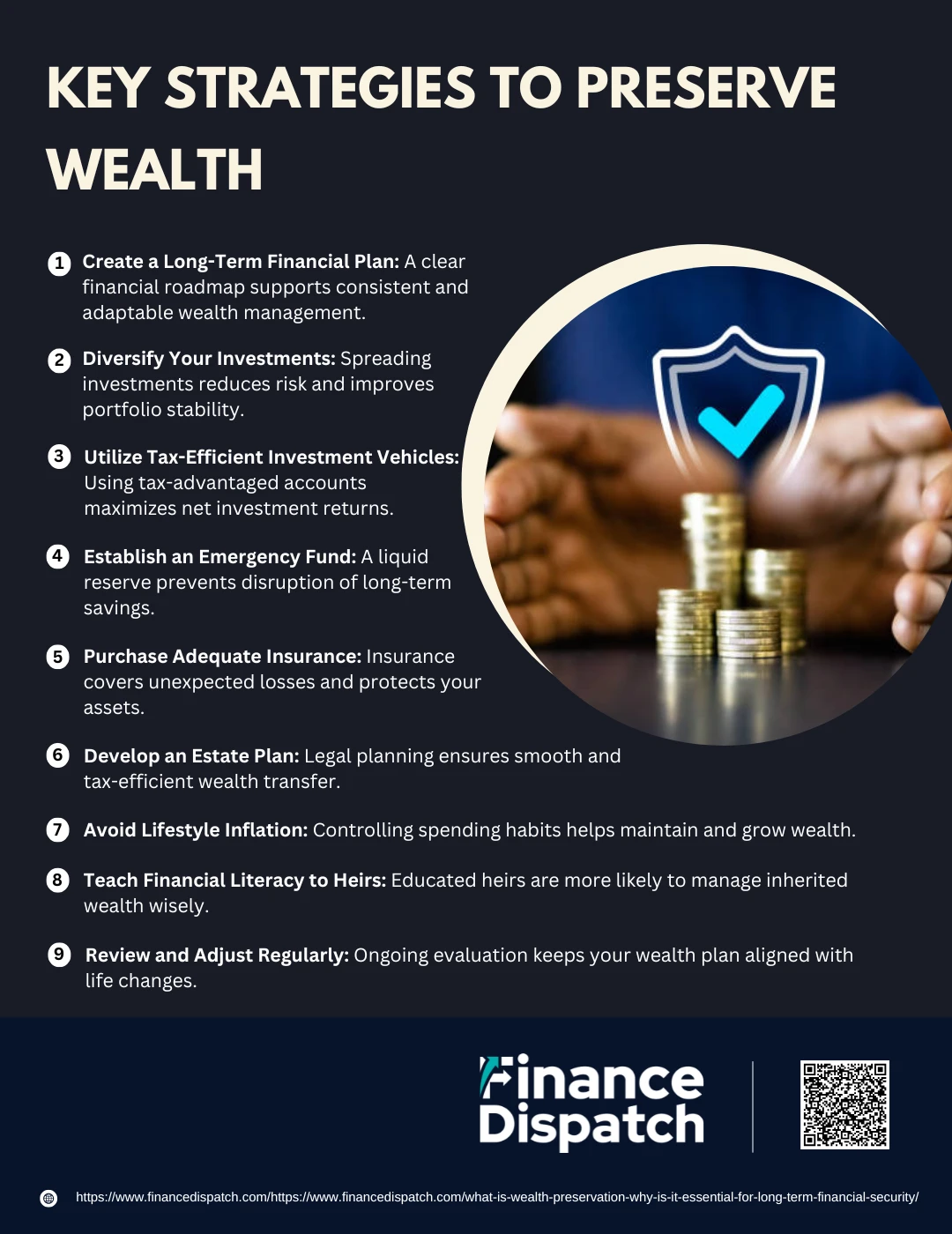Wealth preservation is the strategic process of protecting and maintaining the value of your assets over time. Unlike wealth creation, which focuses on building financial resources through income and investment growth, wealth preservation ensures that what you’ve built is shielded from inflation, market volatility, taxation, and unforeseen life events. In an unpredictable economic environment, preserving wealth isn’t just a luxury for the ultra-wealthy—it’s a critical pillar for anyone aiming to achieve lasting financial stability. Whether you’re planning for retirement, supporting your family, or preparing to leave a legacy, understanding and applying wealth preservation strategies can safeguard your future and secure peace of mind for generations to come.
What is Wealth Preservation?
Wealth preservation refers to the collection of financial strategies and decisions aimed at protecting existing assets from erosion, loss, or mismanagement. It involves maintaining the value of wealth rather than aggressively seeking high-risk growth, focusing instead on stability, security, and longevity. This approach typically includes diversification, risk management, tax optimization, estate planning, and the use of insurance—all designed to ensure that wealth is not only protected in the present but also efficiently transferred to future generations. Unlike wealth accumulation, which emphasizes building assets, wealth preservation is about making those assets last, allowing individuals to maintain their standard of living and meet long-term goals with confidence.
 Why Is Wealth Preservation Essential for Long-Term Financial Security?
Why Is Wealth Preservation Essential for Long-Term Financial Security?
Accumulating wealth is an achievement—but keeping that wealth intact over time is what secures your financial future. Wealth preservation involves a series of thoughtful strategies that protect your assets from risks such as inflation, taxes, poor planning, and market downturns. Whether you’re saving for retirement, planning a legacy, or simply aiming for lifelong financial independence, preserving your wealth ensures that your financial goals are not derailed by uncertainty. It allows you to sustain your lifestyle, support loved ones, and confidently pass down your legacy.
Here are key reasons why wealth preservation is essential for long-term financial security:
1. Protects Against Market Volatility
The financial markets can fluctuate dramatically. Wealth preservation strategies such as portfolio diversification and risk-adjusted investing help shield your assets from severe losses during downturns, ensuring stability even when the economy is unstable.
2. Guards Against Inflation
Over time, inflation erodes the purchasing power of money. By preserving wealth through inflation-resistant investments like real estate, commodities, or treasury inflation-protected securities (TIPS), you ensure your money maintains its value and continues to meet your financial needs.
3. Ensures Legacy and Generational Wealth
Through estate planning tools such as wills, trusts, and gifting, wealth preservation makes it possible to transfer assets efficiently and responsibly. It reduces the chances of wealth being lost to probate costs, legal fees, or mismanagement by unprepared heirs.
4. Supports Retirement and Longevity
As people live longer, retirement can last decades. Without preservation strategies like conservative investing, budgeting, and withdrawal planning, there’s a risk of outliving your savings. Wealth preservation ensures your nest egg lasts throughout your retirement years.
5. Prepares for Unexpected Events
Life is unpredictable. Medical emergencies, job loss, or major home repairs can occur without warning. An emergency fund, combined with insurance coverage, provides a financial cushion that prevents you from dipping into long-term investments or retirement savings.
6. Reduces Tax Liabilities
Tax-efficient strategies such as using Roth IRAs, charitable giving, and proper asset location can significantly reduce how much of your wealth is lost to taxes. This helps grow and maintain your assets over time, maximizing what you keep.
7. Maintains Financial Flexibility and Peace of Mind
When your wealth is protected, you have the freedom to make life decisions without financial anxiety. Whether it’s helping your children through college, supporting aging parents, or launching a passion project, wealth preservation gives you the peace of mind to focus on what matters most.
Core Principles of Wealth Preservation
Wealth preservation is not a one-time action—it’s a long-term mindset built on key financial principles that protect your assets through all stages of life. These principles guide how you manage risk, plan for the future, and ensure that your hard-earned wealth is maintained, not diminished, over time. Whether you’re just starting to build your wealth or planning to pass it on, understanding these core principles can help you stay financially secure for years to come.
Here are the core principles of wealth preservation:
1. Capital Preservation
The foundation of wealth preservation is protecting your principal. This means focusing on low-risk investments and avoiding unnecessary financial exposure that could lead to large losses.
2. Diversification
Spreading investments across various asset classes—such as stocks, bonds, real estate, and commodities—reduces the impact of a poor-performing asset and balances risk.
3. Risk Management
Anticipating and preparing for financial risks—like market crashes, health emergencies, or job loss—through insurance, emergency funds, and smart investment choices helps shield your wealth.
4. Tax Efficiency
Minimizing tax obligations through strategic planning—like using tax-deferred accounts or trust structures—ensures you retain more of your earnings and gains.
5. Estate Planning
Proper estate planning ensures your assets are transferred according to your wishes while minimizing legal costs and taxes. Tools like wills, trusts, and beneficiary designations play a vital role.
6. Liquidity and Accessibility
Keeping part of your portfolio in easily accessible, liquid assets ensures that you can cover short-term needs without disrupting long-term investments.
7. Financial Literacy and Discipline
Ongoing education, budgeting, and disciplined financial habits are crucial for making informed decisions and sustaining wealth over time.
 Key Strategies to Preserve Wealth
Key Strategies to Preserve Wealth
Accumulating wealth is a significant accomplishment—but preserving it requires ongoing planning, discipline, and foresight. Whether you’re protecting your retirement savings, planning to support future generations, or shielding your assets from unexpected risks, adopting the right strategies is essential. Wealth preservation isn’t about avoiding growth—it’s about ensuring that your financial progress is protected and that you maintain control over your future, regardless of economic shifts or personal setbacks.
Here are key strategies to help preserve your wealth:
1. Create a Long-Term Financial Plan
Establishing a financial plan is the foundation of wealth preservation. This plan should outline your goals, both personal and financial, and include a structured budget and savings strategy. Reviewing your plan annually helps you adjust to life changes, market movements, and unexpected expenses without jeopardizing long-term goals.
2. Diversify Your Investments
Diversification spreads your risk across different asset classes, such as stocks, bonds, real estate, and alternative investments. This way, if one sector underperforms, others may balance the loss. A diversified portfolio provides stability and reduces the chance of significant financial setbacks due to market volatility.
3. Utilize Tax-Efficient Investment Vehicles
Taxes can eat away at investment gains if not managed wisely. Using tax-advantaged accounts—like IRAs, Roth IRAs, and 401(k)s—can help you defer or eliminate tax liabilities. You can also take advantage of strategies like tax-loss harvesting and asset location (placing certain assets in taxable vs. tax-deferred accounts) to maximize returns.
4. Establish an Emergency Fund
Life is unpredictable. An emergency fund ensures you’re not forced to tap into long-term savings during financial crises. Set aside at least three to six months’ worth of living expenses in a liquid, accessible account to cover medical emergencies, job loss, or major repairs.
5. Purchase Adequate Insurance
Insurance plays a vital role in protecting your wealth from the financial fallout of unexpected events. Term life insurance can support dependents in the event of your passing, while disability insurance safeguards your income during periods when you’re unable to work. Long-term care insurance and liability coverage also add important layers of protection.
6. Develop an Estate Plan
Estate planning ensures your assets are distributed according to your wishes and not left to the decisions of probate courts. Wills, trusts, powers of attorney, and healthcare directives help reduce tax burdens, avoid family disputes, and preserve wealth across generations.
7. Avoid Lifestyle Inflation
As income grows, so does the temptation to upgrade your lifestyle. While occasional indulgences are fine, consistently increasing your expenses can erode long-term wealth. Instead, maintain a balanced lifestyle and allocate income increases toward savings and investment growth.
8. Teach Financial Literacy to Heirs
Preserving wealth for future generations involves more than just passing down money—it requires passing down knowledge. Educating your heirs about budgeting, investing, and responsible financial behavior can significantly reduce the risk of mismanagement and ensure your legacy thrives.
9. Review and Adjust Regularly
A wealth preservation strategy is not static. It must evolve with changes in the market, tax laws, your career, health, and family circumstances. Schedule regular check-ins—at least annually—with a financial advisor to review your portfolio, insurance policies, estate documents, and overall strategy.
Wealth Preservation for Business Owners
For business owners, preserving personal and business wealth is uniquely complex. Unlike traditional employment, much of a business owner’s net worth may be tied directly to the company. This makes it essential to protect not only personal assets but also the value and continuity of the business itself. Effective wealth preservation for entrepreneurs involves planning for succession, protecting against liability, and optimizing the structure of the business to ensure long-term stability and a smooth transition of assets.
Here are key wealth preservation strategies for business owners:
1. Develop a Succession Plan
Plan early for who will take over your business—whether it’s a family member, partner, or external buyer. A formal succession strategy ensures continuity and reduces disruptions during transition.
2. Get a Proper Business Valuation
Regular business valuations help you understand your company’s worth, prepare for potential sales, and support estate and tax planning.
3. Separate Personal and Business Assets
Structure your finances and legal entities so that your personal wealth isn’t exposed to business liabilities. Consider forming LLCs or corporations to limit personal liability.
4. Purchase Key Person Insurance
If your business heavily relies on one individual—such as yourself or a partner—key person insurance can provide a financial cushion in case of unexpected death or disability.
5. Use Buy-Sell Agreements
These legal contracts establish what happens to a business share if an owner retires, dies, or exits. This protects all stakeholders and provides clarity.
6. Work with Tax and Legal Advisors
Tax-efficient strategies and legal protections (like trusts or holding companies) can help minimize estate taxes, protect assets from lawsuits, and preserve more wealth.
7. Plan for Gradual Exit
Transitioning out of a business takes time. Begin preparing years in advance to ensure a smooth handover of operations, clients, and management responsibilities.
8. Include Your Business in Your Estate Plan
Your business is likely one of your most valuable assets. Make sure it’s addressed in your will or trust to prevent legal complications for heirs.
 Common Wealth Preservation Mistakes to Avoid
Common Wealth Preservation Mistakes to Avoid
Preserving wealth requires more than just building assets—it’s about making wise, forward-thinking decisions that protect those assets for the long haul. Unfortunately, even well-meaning individuals can make critical mistakes that put their financial security and legacy at risk. These errors often stem from neglect, lack of planning, or not adapting to changing circumstances. Understanding the most common pitfalls can help you take smarter steps toward safeguarding your wealth.
Here are the top wealth preservation mistakes to avoid—and why they matter:
1. Neglecting to Create or Update an Estate Plan
Without a current estate plan, your wealth could be caught in lengthy court proceedings, face heavy taxation, or end up in the hands of unintended heirs. A well-crafted estate plan—including a will, trusts, and beneficiary designations—ensures your assets are distributed according to your wishes and avoids costly legal complications.
2. Overconcentrating in a Single Investment or Asset Class
Putting all your wealth into one basket—such as company stock, real estate, or a single business—can backfire if that asset underperforms. Market downturns or sudden industry changes can erode years of growth in a matter of months. A diversified portfolio spreads risk and helps ensure long-term stability.
3. Underestimating the Impact of Taxes
Taxes can quietly chip away at your wealth if you’re not paying attention. Capital gains, estate taxes, and income tax on investment earnings can all reduce your net returns. Incorporating tax-efficient strategies—like using Roth accounts, gifting, and charitable donations—can preserve more of your assets.
4. Skipping Insurance Coverage
Insurance acts as a safety net for your wealth. Without it, a medical emergency, disability, lawsuit, or property damage could wipe out years of savings. Life, disability, liability, and long-term care insurance are crucial tools for protecting your income, health, and assets.
5. Failing to Separate Personal and Business Finances
Many business owners mix personal and company funds, leaving themselves exposed to liability. Without clear separation, legal or financial issues in the business could impact your personal savings, home, or investments. Structuring your business properly—using entities like LLCs or corporations—can protect personal assets from business risks.
6. Not Educating Heirs on Financial Responsibility
Transferring wealth without preparing your children or heirs can lead to mismanagement, overspending, or even family conflict. Teaching financial literacy and involving beneficiaries early in wealth discussions increases the chance that your legacy will be preserved, not squandered.
7. Delaying Succession or Exit Planning
Business owners often avoid planning for retirement or stepping away from their companies. Without a succession or sale plan, your business might struggle to operate or sell for fair value when you’re no longer involved. Early planning allows time to train successors or find buyers and maximize your business’s worth.
8. Ignoring Inflation and Longevity Risks
Assuming today’s dollar will hold the same value decades from now is a dangerous oversight. Rising costs of living and increasing life expectancies can stretch your savings thinner than anticipated. Including inflation-protected assets and planning for a longer retirement helps your wealth keep pace.
9. Failing to Revisit Your Financial Plan
Your wealth plan should evolve as your life does. Major life events like marriage, divorce, the birth of a child, or changes in tax laws should prompt a financial review. Sticking to an outdated plan could mean missing out on better strategies or making costly errors.
10. Relying Solely on Growth Without Protection
Focusing only on growing wealth—without safeguarding it—is like building a castle without walls. High-risk investments without backup plans, emergency funds, or insurance make you vulnerable to sudden losses. A balanced approach that includes both growth and protection is key to long-term security.
How Financial Professionals Support Wealth Preservation
Preserving wealth over the long term requires more than just good intentions—it demands expertise, ongoing attention, and strategic decision-making. That’s where financial professionals come in. From investment planning to tax optimization and estate management, advisors, planners, and legal experts play a crucial role in helping individuals and families build resilient financial plans. Their guidance helps ensure that your wealth is protected from risks and aligned with your long-term goals.
Here’s how financial professionals support wealth preservation:
1. Developing a Comprehensive Financial Plan
Advisors assess your financial situation, understand your goals, and create a tailored plan that integrates budgeting, investing, tax planning, and retirement strategies.
2. Offering Objective Investment Advice
Professionals help you build a diversified portfolio aligned with your risk tolerance, time horizon, and income needs—minimizing emotional decisions that can lead to financial losses.
3. Implementing Tax-Efficient Strategies
Financial experts collaborate with tax advisors to reduce tax liabilities through strategies like Roth conversions, charitable giving, and tax-loss harvesting.
4. Creating and Managing Estate Plans
Estate planning attorneys work with financial planners to establish wills, trusts, and power of attorney documents—ensuring your wealth is transferred according to your wishes while minimizing estate taxes and legal issues.
5. Assessing and Managing Risk
Professionals evaluate your insurance needs, such as life, disability, long-term care, or liability coverage, helping you prepare for unexpected events without depleting your savings.
6. Providing Business Succession Guidance
For business owners, financial professionals can facilitate succession plans, assist with business valuations, and advise on tax-efficient exit strategies.
7. Keeping Your Plan Up to Date
As your life evolves, professionals help review and adjust your financial strategies to reflect changes in income, family circumstances, market conditions, and tax laws.
8. Educating and Guiding Your Heirs
Advisors can also support wealth transition by educating beneficiaries and involving them in the planning process—ensuring they are prepared to manage inherited assets responsibly.
Conclusion
Wealth preservation is a lifelong commitment that requires foresight, discipline, and strategic action. It’s not just about protecting money—it’s about securing your lifestyle, supporting your loved ones, and creating a legacy that lasts. By understanding its core principles and applying key strategies—such as diversification, tax efficiency, estate planning, and professional guidance—you can safeguard your financial future against uncertainty. Whether you’re managing personal investments, running a business, or planning for retirement, preserving your wealth ensures that the success you’ve built today continues to benefit you and your family for years to come.



